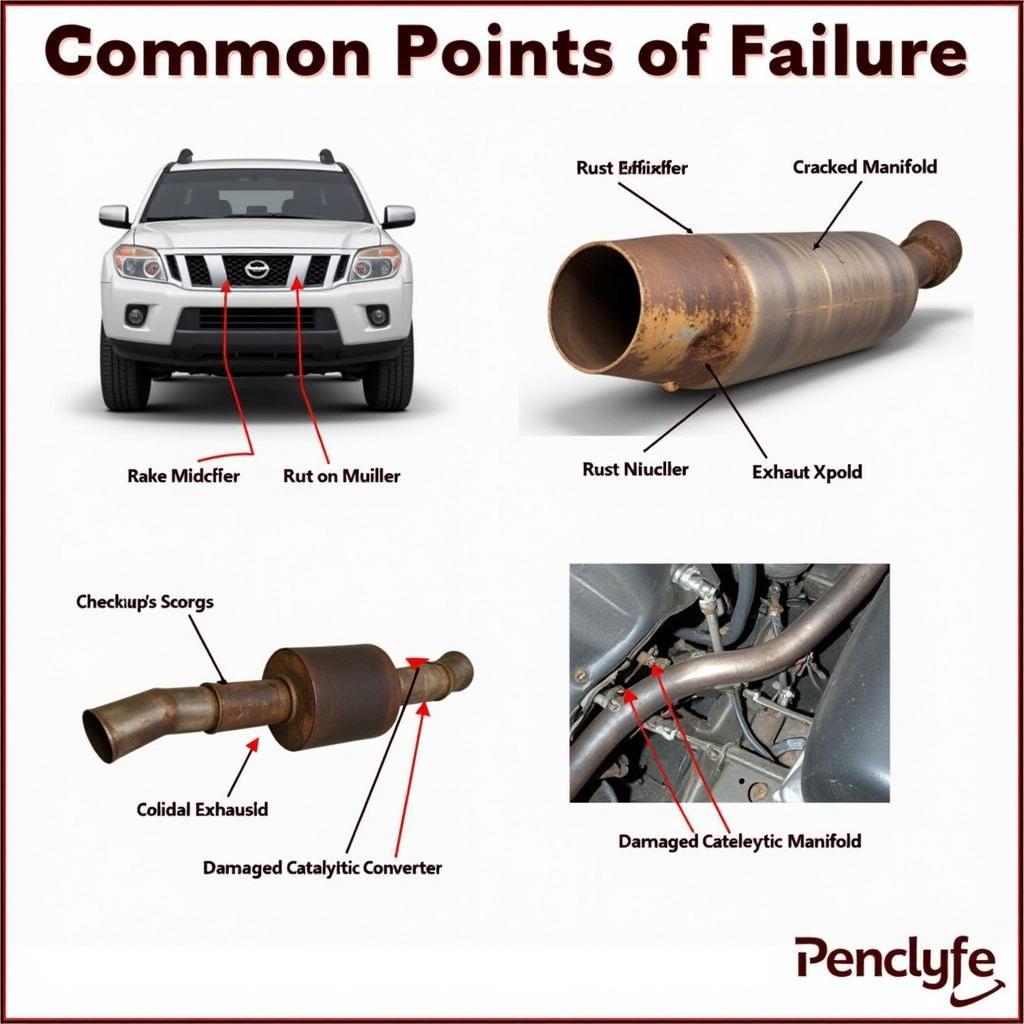Dealing with a faulty car exhaust system? Whether it’s a frustrating rattle, a concerning decrease in fuel efficiency, or the dreaded check engine light, a car exhaust fix can be more straightforward than you think. This guide provides valuable insights into diagnosing, troubleshooting, and repairing common car exhaust issues, empowering car owners, mechanics, and automotive technicians to tackle these problems head-on.
Understanding Your Car’s Exhaust System
Before diving into car exhaust fix solutions, it’s crucial to understand the system’s components and their function. The exhaust system isn’t just a pipe; it’s a complex network designed to safely expel harmful gases, reduce engine noise, and improve fuel efficiency. Key components include the exhaust manifold, catalytic converter, muffler, resonator, oxygen sensors, and tailpipe. Each plays a vital role, and a problem with one can affect the entire system.
Common Car Exhaust Problems and Their Causes
Several issues can plague your car’s exhaust system, ranging from minor annoyances to significant performance problems. Understanding the underlying causes is the first step towards an effective car exhaust fix.
-
Exhaust Leaks: These often manifest as loud noises, decreased fuel efficiency, and a noticeable smell of exhaust fumes inside the cabin. Common culprits include rusted or cracked pipes, loose connections, and damaged gaskets.
-
Catalytic Converter Issues: A failing catalytic converter can trigger the check engine light, reduce engine performance, and cause a sulfur-like smell. Causes include excessive heat, internal damage, and contamination from engine oil or coolant.
-
Muffler and Resonator Problems: A damaged muffler or resonator leads to increased exhaust noise, often a rumbling or droning sound. Rust, impacts, and internal wear and tear are common causes.
-
Oxygen Sensor Malfunction: Faulty oxygen sensors can decrease fuel efficiency, increase emissions, and even damage the catalytic converter. These sensors can fail due to age, contamination, or exposure to excessive heat.
 Identifying Faulty Exhaust System Components
Identifying Faulty Exhaust System Components
Diagnosing Car Exhaust Problems
Accurately diagnosing the issue is paramount for a successful car exhaust fix. Here’s a step-by-step guide:
-
Listen Carefully: Pay attention to any unusual noises, such as hissing, rumbling, or popping. These sounds can often pinpoint the location of the problem.
-
Inspect Visually: Look for signs of rust, cracks, or loose connections in the exhaust pipes, muffler, and other components.
-
Check the Check Engine Light: If illuminated, retrieve the diagnostic trouble codes (DTCs) using an OBD-II scanner. These codes provide valuable clues about the specific issue.
-
Professional Inspection: For complex problems, consider consulting a qualified mechanic who can perform a thorough inspection and diagnose the issue accurately.
DIY Car Exhaust Fix: Simple Repairs You Can Do Yourself
While some car exhaust fix jobs require professional expertise, several minor repairs can be tackled at home with basic tools.
-
Tightening Loose Connections: If you notice rattling or leaking sounds, check for loose bolts or clamps connecting exhaust components. Tightening these can often resolve the issue.
-
Replacing Damaged Hangers: Worn or broken exhaust hangers can cause excessive movement and noise. Replacing them is a relatively simple task.
When to Seek Professional Help for a Car Exhaust Fix
Some car exhaust fix jobs are best left to the professionals. If you encounter any of the following, seek the assistance of a qualified mechanic:
-
Extensive Rust or Damage: Significant rust or damage to exhaust components often requires welding or replacement, which is best handled by a professional.
-
Catalytic Converter Issues: Replacing a catalytic converter is a complex job that requires specialized tools and knowledge.
-
Persistent Exhaust Leaks: If you can’t locate the source of an exhaust leak, a professional can diagnose and repair it effectively.
“Addressing exhaust issues promptly is crucial not only for your vehicle’s performance but also for your safety and the environment,” advises John Miller, a seasoned automotive engineer at Auto Experts Inc.
Car Exhaust Fix: Preventing Future Problems
Regular maintenance is key to preventing car exhaust problems and avoiding costly repairs down the road. Simple steps like regular inspections, addressing minor issues promptly, and using quality replacement parts can significantly extend the life of your exhaust system.
Conclusion
A properly functioning exhaust system is vital for your vehicle’s performance, safety, and environmental impact. This comprehensive guide provides valuable insights into car exhaust fix solutions, empowering you to tackle common problems and maintain a healthy exhaust system. For expert advice and assistance, connect with us at AutoTipPro. Call us at +1 (641) 206-8880 or visit our office at 500 N St Mary’s St, San Antonio, TX 78205, United States.
“Preventive maintenance is the most cost-effective car exhaust fix strategy,” adds Sarah Johnson, a senior mechanic at Reliable Auto Repairs. “Regular checks can save you a lot of trouble in the long run.”
FAQ
-
What are the signs of a bad exhaust system? Common signs include loud noises, decreased fuel efficiency, a noticeable smell of exhaust fumes, and the check engine light.
-
How much does a car exhaust fix cost? The cost varies depending on the specific repair needed, ranging from a few dollars for minor fixes to several hundred dollars for major repairs like catalytic converter replacement.
-
Can I drive with a broken exhaust? While driving short distances with minor exhaust issues might be possible, it’s generally not recommended. A broken exhaust can affect engine performance, fuel efficiency, and even pose safety risks.
-
How often should I get my exhaust system checked? It’s advisable to have your exhaust system inspected annually or as part of your regular vehicle maintenance.
-
How can I prevent exhaust system rust? Regular cleaning, applying rustproofing coatings, and addressing minor rust issues promptly can help prevent extensive rust damage.
-
What are the common causes of catalytic converter failure? Excessive heat, internal damage, and contamination from engine oil or coolant are common causes.
-
How can I tell if my oxygen sensors are bad? Decreased fuel efficiency, increased emissions, and the check engine light are common indicators of faulty oxygen sensors.




Leave a Reply